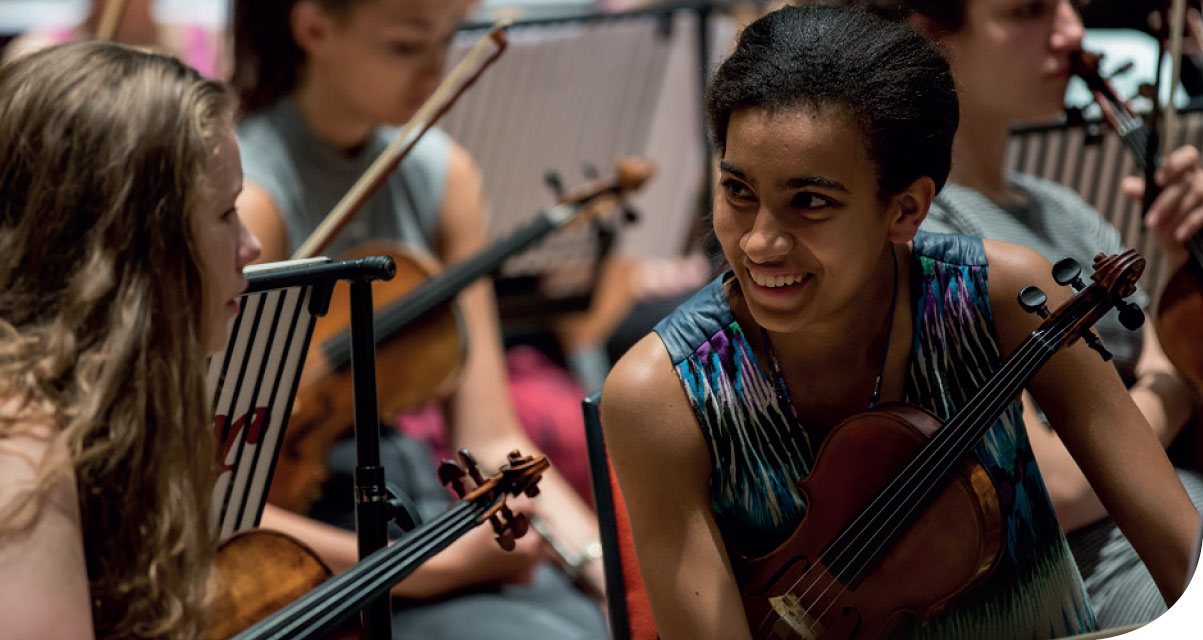
What was your introduction to music?
I have a sister who's about six or seven years older than me and she started on classical cello, so I grew up going to her lessons, listening to her practise and seeing her play in a local string orchestra, – which is where I got the idea that I could play violin. Watching BBC Young Musician when I was about five and seeing Nicola Benedetti win on TV also really inspired me.
You began your musical journey studying at Chetham's School of Music. What was that experience like?
I first found out about Chetham because my older sister's cello teacher said that she should study there. For my sister, it was more of a hobby, so she decided against it, but I thought the idea sounded exciting! I loved the idea of being surrounded by people who loved music as much as I do and being able to play music as much as I wanted. It was a very informative experience. It taught me a lot about discipline and was so inspiring as everyone around me was playing to such a high level, but it was still an encouraging environment. There were so many fantastic performance opportunities too, you'd always have chances to play at professional concerts and take part in performance classes, which isn't something you get at normal schools. Being taught how to deal with performance nerves, year on year really helps you build up a resilience.
For such a young musician, you've had some fantastic opportunities. Did you learn any crucial life lessons during your time as the leader of the National Youth Orchestra (NYO)?
When I became leader of NYO I was quite ill actually. My confidence wasn't where it should have been because I put a lot of pressure on myself, and I ended up getting quite stressed. Unfortunately, I head to step down in the end. Perfectionism is a common trait among performers, but the tricky thing is to tell when you're putting too much pressure on yourself because it often doesn't feel that way, as you're always striving to be the best you can be. Recognising when to stop is important.
You're also involved with the Chineke! Foundation, which is doing incredible work. Would you say that they are helping to make the industry more inclusive?
They've definitely given BME musicians more opportunities to perform. Since the organisation started, we've done some incredible work, such as outreach projects where we'll go into schools and share music from composers that aren't so well known, including BME musicians. It's important to see that people who look like you are playing music – it makes you feel like you can do it too. There was girl in a school in Birmingham, who was also biracial, who came up to me and said, ‘It's so nice watching you as it makes me feel that I could one day be in your shoes.’
How did you get involved with the Junior Department at Royal College of Music (RCM) and what was that experience like?
When I became home educated during my GCSEs, I wanted to be part of a musical group, and I knew that every Saturday there was a Junior Royal College of Music. It was really good for me be in an environment with people who cared about music, and it gave me the opportunity to play in ensembles such as quartets and orchestras, and to learn about theory and musicianship. It was fantastic to be a part of something like that on a regular basis!
You begun studying at the Royal Academy of Music this year. How's that been?
The main thing I've enjoyed have been the lessons with my teacher, which have been particularly brilliant. He always managed to pack so much information into such a short period of time. Performances have also been a real highlight this year. I played Pēteris Vasks violin concerto with Edinburgh University's string orchestra in March and then in July I played the Mendelssohn violin concerto with a musical group local to me. I've always wanted to play concertos with orchestras since I was little, so it's lovely to realise part of my dream.
Is there anything you'd still like to achieve?
One of my main goals is to play as many concertos with orchestras as possible. I'd also love to do some international recitals – even one in America! To travel the world doing as much solo and chamber work as possible is the dream. I also enjoy playing music that isn't just classical. My sister is a singer/songwriter and I occasionally play at her gigs. Since her music is a mixture of soul, pop, and R&B, it adds variety to my playing. My sister and I are very different, I feel more comfortable sight-reading while she's very good at playing by ear. When I'm performing with her, none of the music is ever written down but it forces me to be creative in a different way. While I would be interested in exploring different genres, classical is the one I feel most at home in.

She notes Nicola Benedetti as one of her main inspirations
What advice would you give to musicians just starting out?
Even if it's just a hobby, keep practising regularly. Learning an instrument keeps you disciplined, and it can really help in other parts of your life. If you're a very busy person, it can be quite therapeutic.
You can find out more about Chetham's and its involvement in the Music and Dance Scheme in the Scholarships supplement which accompanied the subscriber's copy of this issue. The supplement can also be bought separately by visiting the magazine's online store: shop.rhinegold.co.uk
Chineke!The Chineke! Foundation was founded in 2015 by Chi-chi Nwanoku to provide ‘career opportunities for young Black and Minority Ethnic (BME) classical musicians in the UK and Europe’. Its accompanying professional orchestra, consisting of mainly BME muscians, is a first for Europe. chineke.org








